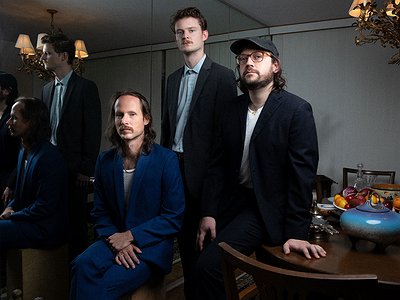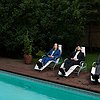Part 1
Name: Gabriel Birnbaum
Occupation: Singer, songwriter, multi-instrumentalist
Nationality: American
Recent release: Wilder Maker's Male Models is out via Western Vinyl. It features Birnbaum's fellow band members Nick Jost and Sean Mullins as well as guest contributions by Adam Duritz, Katie Von Schleicher, Felicia Douglass, Alex Schaaf, V.V. Lightbody, and Mutual Benefit.
Recommendations: Rob Doyle - Threshold
A great novel, funny and self-aware, genuinely searching but never cutesy or precious. I read a ton, and it’s rare for me to find a novel that can balance these things well. I think about this one often. It has the grime and humor of the everyday inanities of modern life, but it also reaches for the infinite. Hard to do both!
Jeff Parker - Forfolks
A gorgeous exploration of the guitar by one of the best. It’s like an exotic landscape to me, each time I listen I find new caves and alleyways I missed before.
If you enjoyed this interview with Gabriel Birnbaum and would like to find out more about him and his work, visit him ad Wilder Maker on Instagram, Facebook, and twitter.
[Read our Katie von Schleicher interview]
When did you start writing/producing/playing music and what or who were your early passions and influences? What was it about music and/or sound that drew you to it?
I grew up listening to my parents' records (Leonard Cohen, The Beatles, Fairport Convention) and to my older siblings practicing piano and cello. My mom tells me she’d pick me up from under the piano, where I’d been playing with blocks, and I’d hum Chopin or Beethoven on the way to bed, whatever Adam had been practicing.
Music has always hypnotized me. When I was five I’d call for them to put Paul Simon’s Graceland on the stereo over and over. At six, I have vivid memories of listening to “Hey Bulldog” by The Beatles on repeat on giant over-the-ear headphones while my family carried on doing whatever around me in the living room. I wrote my first instrumental music on a cheap keyboard I’d gotten for my birthday, I think I was nine. It just seemed natural to write something of my own.
I first picked up the saxophone and followed in my brother’s path as he moved into the jazz world, listening to Duke Ellington, Dizzy Gillespie, and a ton of 1960s Blue Note jazz, trying to be a legit jazz saxophonist. I spent so much money on used CDs at Stereo Jack’s in Cambridge, MA, that they offered me a job one day when I was checking out.
Gradually, I discovered some more contemporary artists, in particular Dave Douglas, who fused jazz with long form ambitious composition in the way that Ellington and Mingus had, and I started writing complex pieces for the Saturday ensembles I played in at New England Conservatory. One of the drummers I played with told me my first record would be called “Mindfuck: the Album” after we’d spent a long time working out a particularly difficult section.
Yesterday at Wilder Maker practice we spent 15 minutes trying to count out if there was a dropped beat in the first instrumental section in “Against Numbers” so I guess not much has changed.
When I listen to music, I see shapes, objects and colours. What happens in your body when you're listening and how does it influence your approach to creativity?
I go into a kind of trance, listening. Everything feels crystal clear and wordless and otherworldly. It’s like a portal. My body recedes, mostly, though it also reacts and moves without my noticing.
The trance state affects my approach in that I have had to learn how to trust my intuition and follow ideas in calm and unbroken focus, without pushing too hard. It’s a little like tuning into the floating shapes on the surface of your eye: if you chase them, they recede at equal speed, but if you stay still they do too.
How would you describe your development as an artist in terms of interests and challenges, searching for a personal voice, as well as breakthroughs?
One thing that has remained constant is that I always want to be pushing myself. Sometimes that’s testing genre boundaries with 12 minute songs that mix rock music with Ethiopian music I’ve been exposed to by playing in Debo Band. Sometimes it’s honing and polishing a set of songs so that I can’t find a single extraneous moment in a whole album.
For a time, I was very angry and I wanted to make music that was just pure electricity and catharsis, and I did that with a band called The Abraham Lincoln Brigade, which featured three saxophones, guitar and drums, and took pride in being louder and wilder than most rock bands.
We were beloved in the Boston weirdo scene, but I felt the danger of repeating myself simply because it was expected and encouraged, and as my personality developed I couldn’t in good faith keep it going. I moved into my songwriter phase, even though everyone discouraged me. It just had to be done. When you feel something is over, you have to let it go. I try to let my internal light guide me, not external feedback.
My writing has narrowed in on a particular style with Wilder Maker, just because I feel like to do something really well you have to commit, but I relish my chances to do projects in different styles, like the 4-track work I did during the lockdown. I never want to stop exploring.
Tell me a bit about your sense of identity and how it influences both your preferences as a listener and your creativity as an artist, please.
I’ve always identified as an outsider, a loser, a weirdo. I’ve just been on my own path doing my own thing - and sometimes that has a funny little overlap with success and most of the time it doesn’t. I rarely fit in with scenes, though I have to say that I have found a community with the Wilder Maker folks that I adore.
I admire artists like Bill Callahan, who spent such a long time making (smog) recordings that are equal parts experimental and songwriting, and then shifting when he felt ready. It’s no way to be a buzz band, but who wants to be a buzz band anyway? It’s just golden shackles.
As a listener, the thing I love above all in music is to be surprised. By a lyric, a twist or turn in a song. It literally makes me laugh out loud. I think humor is underrated in music as well. Sometimes I hear an absolutely over the top guitar solo, and I don’t know if it’s artistic but I do know that it’s delightful and makes me laugh, and that seems like a wonderful thing.
I listen really widely, partly due to my background which includes long stints in pretty much every kind of music, partly just because I’m always trying to find something that will challenge me, make me see music in a different way. Make me want to make something better. I’m an omnivore.
What, would you say, are the key ideas behind your approach to music and art?
At the core of my approach is tension. On the one hand, I think pushing and exploring and creating something that feels new is fundamentally important as an artist, and on the other I really have faith in the intuitive and the subconscious, which is usually unconcerned with novelty.
Often those two things are at odds and I think I spend almost all of my music time finding new ways to navigate that, changing techniques and tools. I’ll come up with a preposterously ambitious concept album and then in the process of executing it find that the music actually sounds far better if I simplify or remove the concept completely. But the whole thing started from the concept and wouldn’t have existed otherwise!
It’s all tension and ambiguity and balance.
How would you describe your views on topics like originality and innovation versus perfection and timelessness in music? Are you interested in a “music of the future” or “continuing a tradition”?
I don’t see myself as adherent to any particular tradition, and I don’t really believe in originality except as a kind of recombination of already existing things.
I’ve made music that exists in pretty much any genre space you can name. I have a strong love of music making that happens in person between multiple people, and an inherent aversion to tools that have a lot of knobs and dials, so I wind up being perceived as a traditionalist I think, but those are really just innate aesthetic preferences.
Some of my most normal “folk rock” songs have tons of weird stretched out samples in them, but I like to make those elements sit inside the song in a way that is a bit too seamless for people to perceive them as “avant-garde.” I wonder sometimes if I was sloppier with my technique if people would see me more that way.
As far as Wilder Maker goes, I love a lot of songwriting from the 1960s and 70s, and that’s in there for sure, but I don’t really think my record could be mistaken for one made then. I just incorporate what I like.
Over the course of your development, what have been your most important instruments and tools - and what are the most promising strategies for working with them?
I had music theory training early on, and I used Finale, the composition software, to chart things out that I wasn’t capable of playing yet. Even though it was just MIDI and sounded like garbage, there was something incredible about making music alone using that as a tool. I wrote differently.
It’s very similar to how, today, working with the 4-track tape machine allows me to throw a certain amount of accident and chance into my music. I spent a lot of time as a kid playing alone and I tried to invent games where an element of chaos (dice rolling, a ball bouncing oddly off a craggy stone wall) would give me something to play off of. It’s no different here, it’s a comfortable and very creative space for me.
For me, collaboration can be socially challenging. I like how it works in Wilder Maker where I bring in the songs and then work with musicians I trust to shape them up, and I like being on the other side of that too. Recently I had the pleasure of co-producing the new Mutual Benefit album and writing string arrangements for the next Katie Von Schleicher LP, and in both cases I felt very creatively alive and activated by sublimating my vision to the vision of the bandleader, trying to find ways to turn up their natural personalities and inclinations.
However, I pretty much always need to be alone to get started. I consider this a personal failing but at this point I’m skeptical of my ability to change it. Sometimes your failures just are who you are. It’s not the worst, as failures go.
As many ambivalent feelings as I have about smartphones, the iPhone is my other major compositional tool. The ability to have a portable recording device and lyric notebook that’s always with me and always about 2 seconds from being in record mode is just too useful to pass up. I have voice memos going back at least 7-8 years on there. I tried to replace it with a non-internet digital recorder, but realistically it was just one more object in my pocket all the time.






